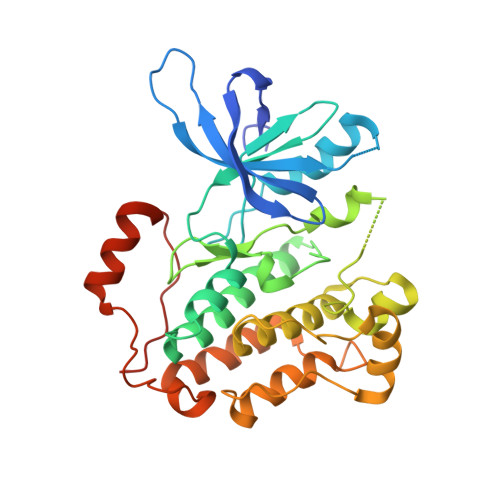Discovery and characterization of a novel irreversible EGFR mutants selective and potent kinase inhibitor CHMFL-EGFR-26 with a distinct binding mode.
Hu, C., Wang, A., Wu, H., Qi, Z., Li, X., Yan, X.E., Chen, C., Yu, K., Zou, F., Wang, W., Wang, W., Wu, J., Liu, J., Wang, B., Wang, L., Ren, T., Zhang, S., Yun, C.H., Liu, J., Liu, Q.(2017) Oncotarget 8: 18359-18372
- PubMed: 28407693
- DOI: https://doi.org/10.18632/oncotarget.15443
- Primary Citation of Related Structures:
5GTY - PubMed Abstract:
EGFR T790M mutation accounts for about 40-55% drug resistance for the first generation EGFR kinase inhibitors in the NSCLC. Starting from ibrutinib, a highly potent irreversible BTK kinase inhibitor, which was also found to be moderately active to EGFR T790M mutant, we discovered a highly potent irreversible EGFR inhibitor CHMFL-EGFR-26, which is selectively potent against EGFR mutants including L858R, del19, and L858R/T790M. It displayed proper selectivity window between the EGFR mutants and the wide-type. CHMFL-EGFR-26 exhibited good selectivity profile among 468 kinases/mutants tested (S score (1)=0.02). In addition, X-ray crystallography revealed a distinct "DFG-in" and "cHelix-out" inactive binding mode between CHMFL-EGFR-26 and EGFR T790M protein. The compound showed highly potent anti-proliferative efficacy against EGFR mutant but not wide-type NSCLC cell lines through effective inhibition of the EGFR mediated signaling pathway, induction of apoptosis and arresting of cell cycle progression. CHMFL-EGFR-26 bore acceptable pharmacokinetic properties and demonstrated dose-dependent tumor growth suppression in the H1975 (EGFR L858R/T790M) and PC-9 (EGFR del19) inoculated xenograft mouse models. Currently CHMFL-EGFR-26 is undergoing extensive pre-clinical evaluation for the clinical trial purpose.
Organizational Affiliation:
High Magnetic Field Laboratory, Chinese Academy of Sciences, Hefei, Anhui 230031, P. R. China.
















